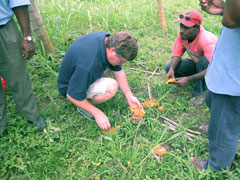
Managing fruit fly on the PNG frontline

The NSW Department of Primary Industries (DPI) is keeping an eye on what has the potential to become a billion dollar pest for Australia’s horticulture industry – fruit fly from Papua New Guinea.
Queensland Fruit Fly (QFF) affects around $1 billion of horticultural products traded interstate as well as $370 million worth of exports, however QFF is only one species.
DPI horticultural scientist, Andrew Jessup, an internationally known researcher on fruit flies, recently led a study tour which will help in developing strategies for managing PNG fruit fly.
Mr Jessup said Papua New Guinea has many different species of fruit fly, and some of these could significantly affect market access for Australia's horticultural crops should they successfully cross the Torres Strait.
“Learning more about the control of these fruit flies will prove invaluable if they do reach Australia.”
Mr Jessup was accompanied on the tour by Professor Andrew Beattie, an entomologist from the University of Western Sydney. Professor Beattie specialises in the use of spray oils to control insect pests.
The project, funded in conjunction with the Australian Centre for International Agricultural Research, aims to help farmers in PNG manage the pests. This will reduce the risk of the pest spreading to Australia.
The researchers visited a number of areas within Papua New Guinea as well as Rabaul, an island in New Britain to the north-west.
According to Mr Jessup, “many of the villagers are subsistence farmers who rely on trading their crops at local markets to earn a little cash. Unfortunately, fruit flies can make up to 75% of the crop unsaleable.”
The project involves testing a number of control methods and demonstrating the effectiveness to local farmers.
“We are working with local Department of Agriculture staff to set up trials in orchards and vegetable plots” said Mr Jessup.
“They are really enthusiastic about the project and very willing to help”.
A series of workshops are planned for next year. These will help the farmers to control the pests as well as communicate research results.
Email:

